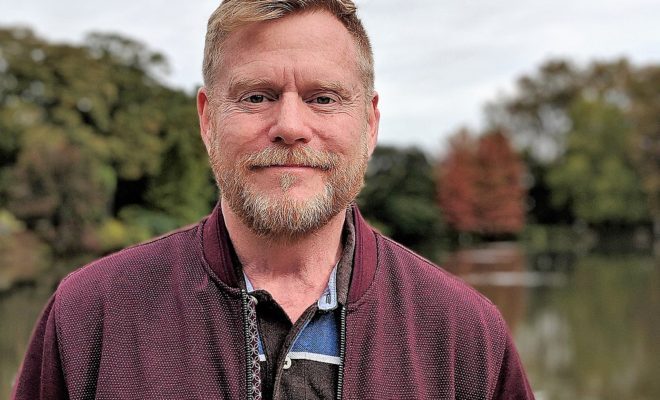
Forgiveness in the Shadows of a Disease: Navigating the Landscape of HIV/AIDS Activism with Mark S. King
Robert P. Graves shares excerpts
from his upcoming book, “Journey’s – Stories, Methodes and the Science
of Forgiveness” exclusively on gaylifeafter40.com
In the vast realm of HIV/AIDS activism, Mark S. King emerges as a resounding voice, a beacon of resilience, and a testament to the transformative power of forgiveness within the realm of advocacy.
Through Mark King’s collection of essays, “My Fabulous Disease: Chronicles of a Gay Survivor,” he reflects the paradoxical beauty and adversity entwined in the fabric of his existence. As we explore the shadows of his experiences, forgiveness emerges not just as a concept but as an unseen lifeline,
guiding him through the challenges posed by his relentless yet beautiful disease.
My first encounter with Mark was in March 2023 at the Saints and Sinners Literary Festival in New Orleans, where we both promoted our books. Mark’s panel discussion on coming of age in the era of HIV/AIDS sparked a question about survivor’s guilt, leading to a heartfelt conversation and the beginning of a friendship. In November 2023, I flew to Atlanta to delve deeper into Mark’s journey, particularly exploring the theme of forgiveness in his life.
There is delicate dance between resilience and vulnerability, an intricate portrayal of a life marked by a diagnosis in an era lacking medical support. His collection of essays and digital presence through his blog invite readers into the intimate spaces of his journey, where forgiveness becomes a crucial thread
stitching together the fragments of his story.
Born out of the necessity to survive in the early years of the HIV epidemic, forgiveness became a means to remove the wreckage causing distress. Mark’s perspective transcends the conventional understanding of forgiveness; it is a dynamic force, adapting to the ever-changing landscape of living with HIV.
Mark emphasizes that forgiveness is an act of self-care, a way of removing obstacles to good health. Drawing from his early years with HIV, marked by a lack of medical assistance and support, he delves into the importance of stress reduction and the removal of distress-causing elements, painting forgiveness as a crucial component of overall well-being.
Mark delves into the sociological shift surrounding HIV diagnoses, he challenges the misconception that individuals in the early years of the epidemic ceased engaging in risky behaviors. Instead, he highlights the complexity of forgiveness, starting with self-forgiveness for actions that might have led to HIV transmission. He acknowledges that forgiveness begins with oneself, especially in the context of
being gay, where societal stigma and misinformation played a significant role.
Mark’s journey unfolds further as he reflects on forgiveness within the realm of activism. The interview explores whether Mark can forgive prominent figures like Ronald Reagan, and his response reflects the complexity of emotions tied to activism. Mark draws a clear distinction between holding individuals and institutions accountable through activism and the personal process of forgiveness.
The conversation delves into the intricacies of forgiveness in the face of ongoing harm. Mark’s refusal to forgive until genuine change occurs reflects a pragmatic approach to activism, where forgiveness is contingent upon measurable actions that positively impact public health. This nuanced perspective sheds light on the delicate balance activists must navigate in preserving their well-being while holding steadfast to their commitment to advocacy.
In the context of HIV activism, Mark’s perspective on forgiveness is unyielding. He emphasizes that forgiveness is not an automatic or unconditional response. It is a deliberate choice, contingent upon acknowledgment of wrongdoing and a genuine commitment to change. Mark’s stance aligns with his commitment to holding individuals and institutions accountable for their actions, particularly those in positions of power who can effect change.
Mark reflects on the influence of role models on his journey of forgiveness. He acknowledges his older brother, Richard, as a significant figure who navigated being gay during the AIDS epidemic. Richard’s ability to let go of the past and find serenity becomes a powerful inspiration for Mark, illustrating the profound impact a role model can have on one’s approach to forgiveness and acceptance.
In short. Mark juxtaposes two influential forces in his life – the activist who forgives nothing and the aging man seeking serenity and contentment. This duality encapsulates the complexity of Mark’s journey, drawing from both the tenacity of activism and the tranquil wisdom derived from a role model who embodies forgiveness and acceptance.
Forgiveness in the shadows of a beautiful disease unveils a tapestry of resilience, self-discovery, and the quest for serenity. From the early years of HIV/AIDS to the complexities of forgiveness within activism, Mark’s narrative serves as a profound exploration of the intricate dance between personal accountability,
societal dynamics, and the pursuit of well-being in the face of life’s challenges.
In the realm of HIV/AIDS activism, forgiveness becomes a dynamic force, adapting to the evolving landscape of living with a relentless yet beautiful disease. Mark’s journey underscores the importance of self-forgiveness, acknowledging the complexities of human nature, and recognizing humanity in the choices made during a frightening period. His perspective on activism and forgiveness adds depth to the conversation, highlighting the pragmatic approach required to navigate the complexities of
societal accountability.
Forgiveness is not a one-size-fits-all concept. It is a nuanced process, deeply intertwined with self-discovery, acceptance, and the quest for serenity. Mark’s unwavering stance on holding individuals and institutions accountable reflects a commitment to tangible actions that positively impact public health.
His story becomes a beacon of inspiration, illustrating that forgiveness is not only a personal journey but also a vital component in the broader tapestry of HIV/AIDS advocacy.
To learn more about Robert P. Graves, or to learn more about the book, please visit his website at Robert P. Graves (robertpgraves.com

